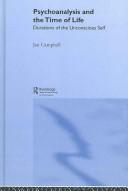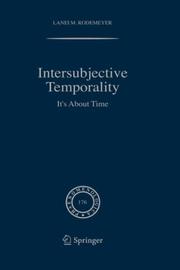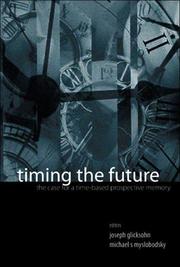| Listing 1 - 10 of 14 | << page >> |
Sort by
|
Book
ISBN: 2847342370 9782847342376 Year: 2006 Publisher: Paris: Tallandier,
Abstract | Keywords | Export | Availability | Bookmark
 Loading...
Loading...Choose an application
- Reference Manager
- EndNote
- RefWorks (Direct export to RefWorks)
Acqui 2006 --- Time perception. --- Time
Book
ISBN: 2940220042 Year: 2006 Volume: 5 Publisher: Genève Université de Genève. Centre universitaire d'étude des problèmes de l'énergie
Abstract | Keywords | Export | Availability | Bookmark
 Loading...
Loading...Choose an application
- Reference Manager
- EndNote
- RefWorks (Direct export to RefWorks)
Human ecology --- Energy --- Ecologie humaine --- Energie --- Time perception --- Congresses --- Time perception.

ISBN: 1583911774 1583911782 Year: 2006 Publisher: New York, NY : Taylor & Francis,
Abstract | Keywords | Export | Availability | Bookmark
 Loading...
Loading...Choose an application
- Reference Manager
- EndNote
- RefWorks (Direct export to RefWorks)
'Psychoanalysis and the Time of Life' examines the relationship between therapy and the time of life, presenting an original and thought-provoking re-reading of psychoanalysis in relation to questions of lived time. Jan Campbell investigates the early work of Freud, Janet, Breuer and Ferenczi, linking their ideas to the philosophy of Bergson. The link between psychoanalysis and the question of time connects these early debates with current issues that are central to our global society. Questions considered include: Is the unconscious based on representation or affect? Is the Oedipal Complex hysterical? How is therapy related to the time of our life? What is the role of hypnosis, in relation to psychoanalytic theory and transference? Freud conceptualized the unconscious as timeless space, but what would it mean to think of the unconscious as the very essence of psychic bodily time? This book draws on the fields of traditional psychoanalysis, philosophy, neuroscience, and trauma studies providing a valuable new perspective on familiar concepts such as identity and consciousness. It will be of interest to students across the humanities and social sciences, and practicing psychoanalysts and psychoanalytic psychotherapists
Psychoanalysis --- Psychoanalysis. --- Time Perception. --- Time perception. --- Time --- Time. --- Unconscious (Psychology). --- Psychological aspects.

ISBN: 9781402042140 9781402042133 1402042132 1402042140 Year: 2006 Publisher: Dordrecht Springer
Abstract | Keywords | Export | Availability | Bookmark
 Loading...
Loading...Choose an application
- Reference Manager
- EndNote
- RefWorks (Direct export to RefWorks)
(YET ANOTHER INTRODUCTION IN PHENOMENOLOGY) In both his published and unpublished works, Edmund Husserl, the "father of phenomenology, struggles repeatedly with the relation of the individual subject and intersubjectivity. Since his phenomenology is based upon the temporalizing foundations of the subject, though, he is often accused of solipsism, and his efforts at integrating the subject with an intersubjective existence are registered as falling short of their goal. Important philosophers who use phenomenology as their basis, such as Martin Heidegger and Maurice Merleau-Ponty, furthermore, while implicitly criticizing his limitations, assume the existence of intersubjective foundations without 2 taking up the existence and formation of these foundations themselves. This book addresses the above problematic at several levels: First, it is a careful analysis of Husserl's understanding of inner time-consciousness. I take up each aspect of temporalizing consciousness (i. e. , Urimpression, retention, and protention), explaining it in light of Husserl's phenomenology and showing how it functions in the whole of the "living present, i. e. , our active, constituting consciousness. These sections of the book are helpful both to the uninitiated student trying to enter the world of Husserl's "inner ti- consciousness" and to the experienced Husserl scholar who desires a closer look at Husserl's theory of temporalizing consciousness. Second, as my analyses take us to Husserl's recently published manuscripts, I provide an explanation of Husserl's later considerations of temporalizing consciousness, showing how he developed his earliest conceptions.
Philosophy --- Psychology --- psychologie --- filosofie --- existentialisme --- Intersubjectivity. --- Time --- Time perception. --- Husserl, Edmund, - 1859-1938. --- Philosophy. --- Husserl, Edmund --- Intersubjectivity --- Time perception
Book
ISBN: 2200268807 9782200268800 Year: 2006 Publisher: Paris : Armand Colin,
Abstract | Keywords | Export | Availability | Bookmark
 Loading...
Loading...Choose an application
- Reference Manager
- EndNote
- RefWorks (Direct export to RefWorks)
Coupé du passé, inquiet de l'avenir, notre présent est fragmenté : temps marchand, temps de l'expérience vécue, temps de la prise de risque, etc. Toute analyse d'une société donnée doit prendre en compte l'imbrication et l'évolution de ces temporalités diverses, et se référer globalement à la manière dont chaque groupe humain conçoit, " fabrique " et organise " son " temps. Après les retours nécessaires sur les modalités et la relativité de la perception du temps selon les époques et cultures, l'auteure cible le temps de la modernité. Elle analyse les efforts fournis par la société pour en reprendre le contrôle, en liaison avec un ensemble de problèmes sociétaux, et met en évidence la place centrale que la question occupe au cœur de toutes les interrogations et conflits contemporains. L'ouvrage offre ainsi une réflexion en phase avec de nombreux débats (droit à construire sa vie, organisation du travail, transports, etc.), qui sera du plus grand profit pour les étudiants de licence et master, les enseignants et chercheurs en sciences sociales, ainsi que pour les professionnels de l'action sociale.
Time perception --- Time --- Perception du temps --- Temps --- Social aspects --- Aspect social
Book
ISBN: 9780739109977 9780739114513 Year: 2006 Publisher: Lanham : Lexington Books,
Abstract | Keywords | Export | Availability | Bookmark
 Loading...
Loading...Choose an application
- Reference Manager
- EndNote
- RefWorks (Direct export to RefWorks)
Drawing on the work of Henri Lefebvre and Barbara Adam, Gender, Space, and Time is a brilliant study that offers a unique and original threefold conceptualization of how space and time is developed and applied in an empirical study of women's lives. Moss conceptualizes women as centers of action and demonstrates the ways in which they construct personal pathways, connect different spheres of experience, intergrate new time demands into the multiple rhythms of their everyday lives, and carve out personal space.
Women --- Time perception. --- Spatial behavior. --- Femmes --- Perception du temps --- Comportement spatial --- Education (Higher) --- Time management. --- Enseignement supérieur --- Budgets temps
Book
ISBN: 9782100497683 2100497685 Year: 2006 Publisher: Paris : Dunod,
Abstract | Keywords | Export | Availability | Bookmark
 Loading...
Loading...Choose an application
- Reference Manager
- EndNote
- RefWorks (Direct export to RefWorks)
« Le temps a une consistance et cette consistance est psychique.» Tel est le fil conducteur de ce livre qui ouvre à une compréhension intime de la temporalité selon une approche psychanalytique. L'ouvrage s'articule autour de 3 axes : 1) les relations dialectiques du temps psychique et de la mémoire, 2) la clinique de la temporalité : pathologie et restructuration par le travail thérapeutique, 3) les expériences extra-temporelles (expérience esthétique, mystique, schizophrénie).
Time perception --- Time - Psychological aspects --- Memory - Psychological aspects --- Psychoanalysis --- Time --- Memory --- Temps --- Mémoire --- Psychological aspects --- Aspect psychologique --- Aspect psychologique. --- Psychopathology --- Mémoire
Book
ISBN: 2310559077 Year: 2006 Publisher: Paris : Presses universitaires de France,
Abstract | Keywords | Export | Availability | Bookmark
 Loading...
Loading...Choose an application
- Reference Manager
- EndNote
- RefWorks (Direct export to RefWorks)
Space and time in language. --- Time perception. --- Time --- Semiotics. --- Espace et temps dans le langage --- Perception du temps --- Temps --- Sémiotique --- Sociological aspects. --- Aspect sociologique

ISBN: 1281908959 9786611908959 9812707123 9789812707123 9812564977 9789812564979 9781281908957 6611908951 Year: 2006 Publisher: Hackensack, NJ World Scientific
Abstract | Keywords | Export | Availability | Bookmark
 Loading...
Loading...Choose an application
- Reference Manager
- EndNote
- RefWorks (Direct export to RefWorks)
In this volume, leading researchers bring together current work on time perception and time-based prospective memory in order to understand how people time their intentions. This is the first account of many important topics concerning the timing of behavior, offered by scientists of diverse fields who in the past have exhibited an attitude of mutual 'benign neglect'. An explication of the rules which govern timing the future are of fundamental interest to anyone who wishes to explore the potential of human experience.Prospective memory - especially time-based - is a relatively unexplored way
Time perception. --- Time perspective. --- Prospective memory. --- Future time perspective --- Perspective, Time --- Timetable --- Chronometry, Mental --- Duration, Intuition of --- Intuition of duration --- Mental chronometry --- Time --- Time, Cognition of --- Time estimation --- Orientation (Psychology) --- Perception --- Memory

ISBN: 9781402042140 1402042132 9781402042133 1402042140 1280461276 9786610461271 9048170753 Year: 2006 Volume: 176 Publisher: Dordrecht, The Netherlands : Springer,
Abstract | Keywords | Export | Availability | Bookmark
 Loading...
Loading...Choose an application
- Reference Manager
- EndNote
- RefWorks (Direct export to RefWorks)
(YET ANOTHER INTRODUCTION IN PHENOMENOLOGY) In both his published and unpublished works, Edmund Husserl, the "father of phenomenology,” struggles repeatedly with the relation of the individual subject and intersubjectivity. Since his phenomenology is based upon the temporalizing foundations of the subject, though, he is often accused of solipsism, and his efforts at integrating the subject with an intersubjective existence are registered as falling short of their goal. Important philosophers who use phenomenology as their basis, such as Martin Heidegger and Maurice Merleau-Ponty, furthermore, while implicitly criticizing his limitations, assume the existence of intersubjective foundations without 2 taking up the existence and formation of these foundations themselves. This book addresses the above problematic at several levels: First, it is a careful analysis of Husserl's understanding of inner time-consciousness. I take up each aspect of temporalizing consciousness (i. e. , Urimpression, retention, and protention), explaining it in light of Husserl's phenomenology and showing how it functions in the whole of the "living present,” i. e. , our active, constituting consciousness. These sections of the book are helpful both to the uninitiated student trying to enter the world of Husserl's "inner ti- consciousness" and to the experienced Husserl scholar who desires a closer look at Husserl's theory of temporalizing consciousness. Second, as my analyses take us to Husserl's recently published manuscripts, I provide an explanation of Husserl's later considerations of temporalizing consciousness, showing how he developed his earliest conceptions.
filosofie --- existentialisme --- psychologie --- Philosophy --- Psychology --- Husserl, Edmund --- Intersubjectivity --- Time perception --- Time --- Academic collection --- Chronometry, Mental --- Duration, Intuition of --- Intuition of duration --- Mental chronometry --- Time, Cognition of --- Time estimation --- Orientation (Psychology) --- Perception --- Ontology --- Phenomenology --- Social psychology --- Subjectivity --- Husserl, Edmond --- Intersubjectivity. --- Time perception. --- Philosophy. --- Husserl, Edmund, --- Phenomenology . --- Philosophy (General). --- Phenomenology. --- Philosophy, general. --- Psychology, general. --- Philosophy, Modern --- Psychology. --- Behavioral sciences --- Mental philosophy --- Mind --- Science, Mental --- Human biology --- Soul --- Mental health --- Humanities --- Time - Philosophy. --- Husserl, Edmund, - 1859-1938.
| Listing 1 - 10 of 14 | << page >> |
Sort by
|

 Search
Search Feedback
Feedback About UniCat
About UniCat  Help
Help News
News